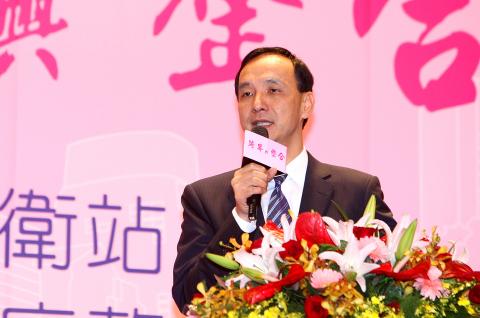An opinion poll published yesterday showed that former Democratic Progressive Party (DPP) chairperson Tsai Ing-wen (蔡英文) and New Taipei City (新北市) Mayor Eric Chu (朱立倫) of the Chinese Nationalist Party (KMT) are seen as politicians most capable of fighting corruption, with each winning support from more than 40 percent of respondents.
Tsai was named as the most trustworthy politician among a selection of 10 politicians when it comes to tackling corruption, with a support rate of 46.5 percent in the survey conducted by Taiwan Indicators Survey Research (TISR). Chu was second with 41.1 percent.
All four DPP politicians on the list were in the top five. DPP Chairman Su Tseng-chang (蘇貞昌) came in third with 38.5 percent, ahead of Greater Kaohsiung Mayor Chen Chu’s (陳菊) 37.2 percent and Greater Tainan Mayor William Lai’s (賴清德) 34.3 percent.

Photo: Ho Yu-hua, Taipei Times
The results showed widespread public disappointment with the government’s efforts to fight graft, as President Ma Ying-jeou (馬英九) and Vice President Wu Den-yih (吳敦義), plagued by a series of government corruption cases, endured embarrassing results.
Ma ranked second to last with 17.6 percent, while Wu was last with 12.6 percent. Premier Jiang Yi-huah (江宜樺) placed eighth, one place above Ma, with 18.4 percent, trailing Greater Taichung Mayor Jason Hu (胡志強) and Taipei Mayor Hau Lung-bin (郝龍斌).
With regards to political parties, 30.1 percent said both the KMT and the DPP were incapable of monitoring potential corruption when in power, with 26.2 percent saying the DPP was better and 18.9 percent voting for the KMT. Just 6.2 percent supported both parties’ efforts, while 18.6 percent were unsure.
The survey also found that people’s confidence in the judicial system has dramatically waned since 2006, with 69.2 percent saying they did not believe the judicial system could uphold fairness and justice.
That was up from 48.5 percent who expressed their lack of confidence in the judiciary in 2006, 47.2 percent in 2009 and 63.3 percent in July last year, TISR said.
Only 18.6 percent believed that justice and fairness would be upheld, a far cry from the 40.4 percent in 2006 and 39.1 percent in 2009.
The poll, conducted on Monday and Tuesday, had 1,005 valid samples and a margin of error of 3.1 percentage points.

NATIONAL SECURITY THREAT: An official said that Guan Guan’s comments had gone beyond the threshold of free speech, as she advocated for the destruction of the ROC China-born media influencer Guan Guan’s (關關) residency permit has been revoked for repeatedly posting pro-China content that threatens national security, the National Immigration Agency said yesterday. Guan Guan has said many controversial things in her videos posted to Douyin (抖音), including “the red flag will soon be painted all over Taiwan” and “Taiwan is an inseparable part of China,” while expressing hope for expedited “reunification.” The agency received multiple reports alleging that Guan Guan had advocated for armed reunification last year. After investigating, the agency last month issued a notice requiring her to appear and account for her actions. Guan Guan appeared as required,

Japan and the Philippines yesterday signed a defense pact that would allow the tax-free provision of ammunition, fuel, food and other necessities when their forces stage joint training to boost deterrence against China’s growing aggression in the region and to bolster their preparation for natural disasters. Japan has faced increasing political, trade and security tensions with China, which was angered by Japanese Prime Minister Sanae Takaichi’s remark that a Chinese attack on Taiwan would be a survival-threatening situation for Japan, triggering a military response. Japan and the Philippines have also had separate territorial conflicts with Beijing in the East and South China

A strong cold air mass is expected to arrive tonight, bringing a change in weather and a drop in temperature, the Central Weather Administration (CWA) said. The coldest time would be early on Thursday morning, with temperatures in some areas dipping as low as 8°C, it said. Daytime highs yesterday were 22°C to 24°C in northern and eastern Taiwan, and about 25°C to 28°C in the central and southern regions, it said. However, nighttime lows would dip to about 15°C to 16°C in central and northern Taiwan as well as the northeast, and 17°C to 19°C elsewhere, it said. Tropical Storm Nokaen, currently

PAPERS, PLEASE: The gang exploited the high value of the passports, selling them at inflated prices to Chinese buyers, who would treat them as ‘invisibility cloaks’ The Yilan District Court has handed four members of a syndicate prison terms ranging from one year and two months to two years and two months for their involvement in a scheme to purchase Taiwanese passports and resell them abroad at a massive markup. A Chinese human smuggling syndicate purchased Taiwanese passports through local criminal networks, exploiting the passports’ visa-free travel privileges to turn a profit of more than 20 times the original price, the court said. Such criminal organizations enable people to impersonate Taiwanese when entering and exiting Taiwan and other countries, undermining social order and the credibility of the nation’s